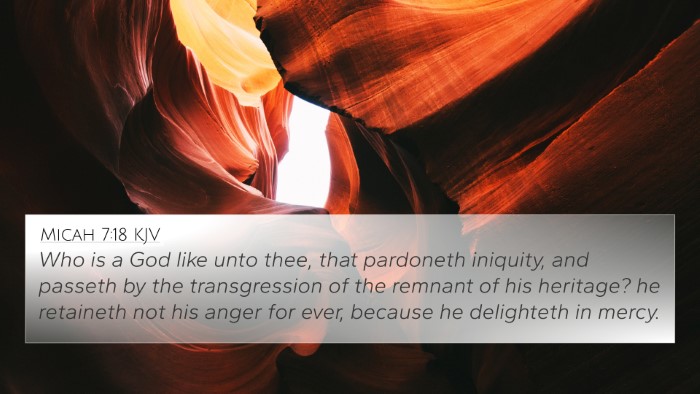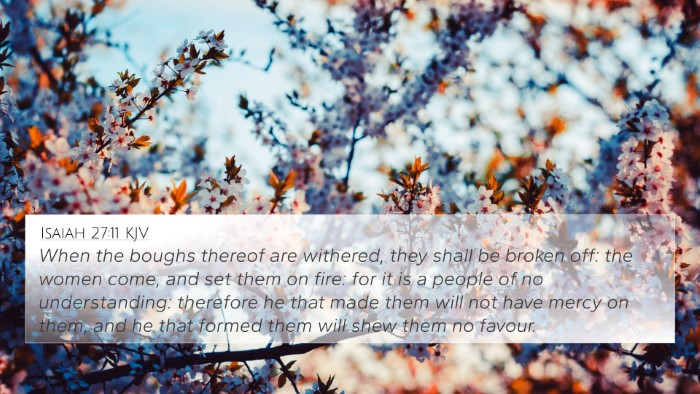Meaning of Romans 9:15
Bible Verse: Romans 9:15
This verse reads: "For he saith to Moses, I will have mercy on whom I will have mercy, and I will have compassion on whom I will have compassion."
Interpretation and Insights
Romans 9:15 delves into the theme of God's sovereignty in dispensing mercy and compassion. Drawing from public domain commentaries, we can derive a more comprehensive understanding of this verse.
- According to Matthew Henry, this verse encapsulates God's absolute authority over His creation. It indicates that divine mercy is not subject to human standards or expectations but is granted according to God's will.
- Albert Barnes emphasizes that God's mercy cannot be earned or deserved; instead, it is an unmerited gift that He bestows sovereignly. This reflects the larger context of salvation and grace that permeates the New Testament.
- Adam Clarke points out that quoting God in this manner calls attention to the freedom of divine grace. God’s choices in choosing whom to bestow mercy upon reveal His plan, which transcends human understanding.
Theological Implications
This passage raises profound questions concerning divine justice and mercy. It reflects a key theological concept that is evident throughout Scripture—God's prerogative to choose whom He will save and how. The implications extend into discussions about predestination and free will.
Related Topics in Scripture
Several themes can be explored through cross-referencing this verse with other biblical texts:
- Exodus 33:19 - This verse is the origin of the quote, where God tells Moses about His sovereign choice of mercy.
- Ephesians 1:4-5 - Here, Paul speaks of predestination, resonating with the idea of God choosing whom He will bless.
- James 2:13 - The connection between mercy and judgment, highlighting that mercy triumphs over judgment, underlines the importance of God's mercy.
- Matthew 20:15 - This verse discusses God's sovereignty in deciding how much to reward His laborers, similar to the mercy shown to individuals.
- Romans 11:33-36 - The depth of God’s wisdom and the mysteries of His decisions are echoed in Paul’s doxology.
- 2 Timothy 1:9 - This verse affirms that God saves and calls according to His own purpose and grace.
- John 1:12-13 - The contrast between born of God and born of flesh highlights God’s initiative in bestowing salvation.
Thematic Connections
The themes present in Romans 9:15 connect to broader biblical narratives regarding grace, justice, and the nature of God's character:
- God's Sovereignty - Throughout the Bible, God demonstrates His ultimate authority and freedom in making choices regarding humanity.
- Divine Mercy - Instances of mercy throughout Scripture, such as Jonah's reluctance to see Nineveh saved, show God’s willingness to forgive.
- Human Responsibility - The balance of God’s sovereignty and human response is a critical discussion point in various epistles.
Conclusion
Romans 9:15 sheds light on the profound truths of God’s character and His sovereignty over mercy. As evidenced through cross-referencing with parallel scriptures, understanding this verse can enrich one’s theological perspective.
Exploring additional connections between verses enhances our comprehension of the interconnectedness of biblical themes, providing tools for deeper study.
Further Study Tools
To facilitate deeper understanding and analysis of biblical texts related to Romans 9:15, the following tools may be helpful:
- Bible Concordance - Useful for finding and indexing terms and their related scriptures.
- Bible Cross-reference Guide - Provides an organized way to connect themes, terms, and narratives across the Bible.
- Cross-reference Bible Study - Techniques that enhance reading and understanding of scripture through thematic connections.
- Bible Reference Resources - Comprehensive materials that assist in theological study and sermon preparation.
Researching Cross-References
When studying the Bible, discovering cross-references can illuminate connections. Engaging with themes such as mercy, sovereignty, and salvation encourages individuals to explore firsthand the richness of Scripture.
Through careful analysis and prayerful consideration, believers can deepen their understanding of how verses interact, reflecting a cohesive narrative from Genesis to Revelation.








